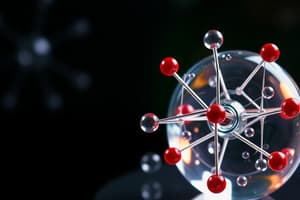Podcast
Questions and Answers
What is the primary reason for employing various techniques to ensure reliable measurements and interpretations in scientific research?
What is the primary reason for employing various techniques to ensure reliable measurements and interpretations in scientific research?
- To minimize error margins and improve accuracy
- To introduce necessary controls in experiments
- To account for potential confounding factors
- All of the above (correct)
In the context of studying the effect of light intensity on photosynthesis, what would the researcher do to ensure that light intensity remains the sole variable affecting the observed phenomenon?
In the context of studying the effect of light intensity on photosynthesis, what would the researcher do to ensure that light intensity remains the sole variable affecting the observed phenomenon?
- Increase the number of soil samples
- Maintain consistent temperature conditions (correct)
- Vary the soil nutrient concentration
- Adjust the humidity levels
What does the flexible yet rigorous approach to scientific research allow?
What does the flexible yet rigorous approach to scientific research allow?
- A strict linear progression of the scientific method
- Iterative refinement of hypotheses and experiments
- Abandonment of initial assumptions based on new findings
- Both b and c (correct)
What is the primary importance of understanding the principles of scientific study in biology?
What is the primary importance of understanding the principles of scientific study in biology?
What is the primary purpose of introducing necessary controls in experiments when studying the effect of a variable?
What is the primary purpose of introducing necessary controls in experiments when studying the effect of a variable?
Which of the following is not a key aspect of ensuring reliable measurements and interpretations in scientific research?
Which of the following is not a key aspect of ensuring reliable measurements and interpretations in scientific research?
What is the primary focus of the scientific study of biology?
What is the primary focus of the scientific study of biology?
Which of the following is NOT a key component of the scientific method in biology?
Which of the following is NOT a key component of the scientific method in biology?
In the example provided, the biologist is investigating the relationship between which two variables?
In the example provided, the biologist is investigating the relationship between which two variables?
What is the purpose of the biologist's experiment in the example?
What is the purpose of the biologist's experiment in the example?
What is the relationship between the hypothesis and the experimental results in the scientific method?
What is the relationship between the hypothesis and the experimental results in the scientific method?
Which of the following is a key aspect of precision in data collection in scientific study?
Which of the following is a key aspect of precision in data collection in scientific study?
Flashcards are hidden until you start studying
Study Notes
Science and Scientific Study: Focusing on Biology
Overview
Science and scientific study encompass various branches of knowledge, each with its unique focus and methodologies. Among these, biology stands out as the study of living organisms and their interactions with their environments. Here, we delve into the principles and practices of scientific study within the context of biology, exploring concepts such as the scientific method, hypotheses, experimental design, and precision in data collection.
The Scientific Method in Biology
The scientific method is a systematic process used to acquire knowledge rooted in empirical evidence. It involves making observations, forming hypotheses, conducting experiments, analyzing results, and drawing conclusions. Biologists use this method to generate testable hypotheses about the natural world, propose explanations for observed phenomena, and design experiments to verify or refute these hypotheses.
For example, consider a biologist investigating the relationship between diet and plant growth. They might hypothesize that increased nitrogen availability leads to faster plant growth. Through carefully designed experiments involving varying nitrogen levels, they would collect data to either accept or reject the hypothesis. The acceptance or rejection of the hypothesis depends on the consistency between the predicted outcomes and the actual experimental results.
Precision in Data Collection
In scientific research, accuracy and precision in data collection are crucial. Researchers employ various techniques to ensure reliable measurements and interpretations. For instance, they might measure the concentration of a nutrient in a soil sample, comparing values obtained from several samples to minimize error margins.
Considering the complexity of biological systems, it's essential to account for potential confounding factors and introduce necessary controls in experiments. For example, in studying the effect of light intensity on photosynthesis, a researcher would maintain consistent temperature conditions, ensuring that light intensity remains the sole variable affecting the observed phenomenon.
Flexibility in Scientific Research
While the scientific method is a logical framework guiding scientific inquiry, it doesn't imply a strict linear progression. Often, scientists iteratively refine their hypotheses, adjust their experiments, and reconsider their initial assumptions based on emerging insights. This flexible yet rigorous approach allows science to evolve and adapt to new findings.
Future Directions
Understanding the principles of scientific study in biology paves the way for further exploration. As scientists continue to tackle pressing challenges, such as climate change, disease prevention, and sustainable resource management, their ability to design precise, relevant, and impactful experiments is paramount. By fostering collaboration across disciplines and continents, we can unlock the full potential of scientific research in addressing the complexities of our ever-changing world.
Studying That Suits You
Use AI to generate personalized quizzes and flashcards to suit your learning preferences.




